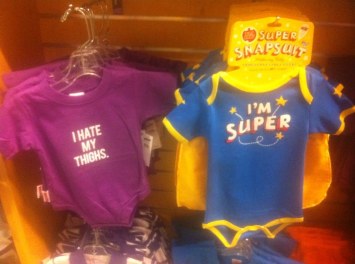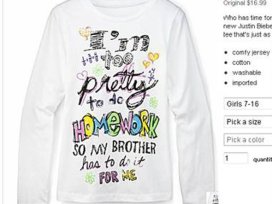**This post is going to be different than my usual posts on this blog. It’s going to be a thought/opinion piece (and will get a little personal) as opposed to my usual posts where I do a lot of research and quote stuff.**
There has been a recent trend in my life of 29 to 31 year old men dumping their girlfriends without warning and (seemingly) without reason. In the past month, this has happened to four women I know (myself included–a six and a half year relationship ended out of the blue, via the phone, the night before my Masters graduation ceremony). Each of us was left stunned, bereft, and confused. Wtf? Wasn’t everything going fine? We weren’t fighting. We were planning a future together. What the hell happened? The men gave little explanation: I’m not feeling it, we’re too different, we’re in different places–typical vague BS that you spout when you don’t want to tell someone what is really going on in your head.
After the breakup, I spent weeks trying to coax myself to shower, eat, and debated whether I needed to admit myself to the ER for a psych evaluation. I talked with friends and continually lamented whyyyyyy?? How does someone end a relationship completely out of the blue like that? And why would they do that?
I went for a walk with a friend one afternoon; a friend who had also gone through her fair share of heartbreak and significant others up and leaving out of the blue. I talked about the “differences” my ex threw out as reasons why we weren’t meant to be in a long term relationship (because six and a half years isn’t already long term?). “He said that I want to travel and move around too much,” I told my friend. “He’s decided he doesn’t want to do that.”
“That’s a pretty significant difference,” my friend said.
“That’s the same difference my mum and dad had,” I countered. X and I had always differed in our wanderlust. We’d known each other for thirteen years and nothing about my want to travel and move around had ever changed. His wanderlust had seemed to change, but then suddenly snapped back without warning (at least without any warning for me). The fact that travel and moving was suddenly a deal breaker felt suspect to me. “My dad was a hometown guy, who never dreamed of leaving the country, but he did. He and my mum lived in Iceland and England, and then dad went to Cuba and Germany, they traveled through South America. How could my dad do it, but X can’t?”
“It’s a millennial thing,” my friend said. “Our parents are from a generation where you worked at a relationship. You compromised, you fought, and you worked things out because you didn’t have the Internet, and if you broke up with someone there was a chance you would never see them again. Millennials just don’t care to put in the work. If a relationship gets hard, we just leave it.”
I thought about this comment. Was she right? Do millennials just not put effort into relationships? The divorce rates among Baby Boomers have doubled in the past year, but the marriage rate for millennials is also at an all time low. Is this because we can find a date just by swiping right, so why put up with a significant other who doesn’t check every single box on our Mr/Mrs Right checklist? Even though my fridge and my Facebook feed are covered in engagement and wedding announcements, statistics say that 59% of millennials have never been married. In 2014, a Gallup poll showed only 27% of millennials as being married (59% were single and never married). When Baby Boomers were the same age as millennials, 48% of them were married. That’s a fairly big difference.
So what’s happening? Why aren’t millennials getting married?
I think there are several factors. (Again, this is an opinion piece. Trolls, calm yourselves.) First, there is the aforementioned divorce rate of the Baby Boomers. Millennials have grown up watching/hearing about their parents and grandparents getting divorced. I’ve seen everything from the amicable separation to the knock-em-out-drag-em-out brawl of a messy divorce. Millennials don’t want to go through that. (I’m not saying that any generation wants to get divorced, but millennials had the advantage of witnessing the mistakes and aftermath firsthand.) This is why millennials have a higher rate of living with a partner before they decide to get hitched. Or just living with a partner and never getting hitched (but never is a strong word seeing as the oldest millennials are not quite 40 years old yet).
Another factor is social media and dating apps. With Facebook, people can keep in touch with everyone from their college roommate to their family members and even a person they met once on a plane and now they see each other’s Facebook updates. We can converse with thousands of people without leaving our home or putting on pants! This means we have a pretty solid idea of just how many “fish are in the sea.” If you breakup with your boyfriend, you can just Facebook message that cute guy you’ve been eyeing in class. If you’re looking for something to do on a Saturday night, join a Meetup group and meet some new people. The social possibilities are limitless and suddenly being single doesn’t feel that lonely. It also seems like there’s a new dating app/website being created every day: Tinder, Grindr, Bumble, Coffee Meets Bagel, OkCupid, Hinge, Grouper, etc etc. Why tie yourself down to one person when you can go on a date with a different person nearly every night of the week? And if you’re in a big city, your dating pond is practically an ocean.
Basically, millennials know there are a plethora of options out there. For many, dating apps seem like a guaranteed stepping stone to a committed, long term relationship (which, for those keeping up, means dating longer than six and a half years apparently–yeah, I’m a bit bitter), so signing up for one feels like a last resort/back-up option.
I think millennials are also not getting married because, at times, marriage can feel archaic and old fashioned. Our generation is swiftly escaping the confines of what was once defined as a “traditional” marriage. Millennials are overwhelming in support of marriage equality, scores of women are not taking their husband’s last name, some men are taking their wife’s last name, and many couples are either combining or creating completely new last names. Many of us also just don’t want to deal with the legal and financial hassle of buying a home together, settling down, owning things more expensive than our laptops, and every other scary thing that screams, “I’M AN ADULT.”

(Side note: I don’t mean to rag on marriage. I think marriage is great and I hope to one day be married, although currently my cold, dead heart does not envision that ever happening. I told my counselor that one of my greatest fears was that no one would ever want to marry me and now that prediction has come true. She told me I must think myself psychic because I clearly enjoy predicting the future.)
Millennials are flighty. As a whole, we tend to jump from one project to another. We multitask, we have lofty goals, and we believe in attaining our dreams rather than trudging through the every day grind. This is why so many millennials are entrepreneurs. Why slog through a 9-5 job that you hate when you can do what you love and be your own boss? I’m not saying that this works for everyone, but it is definitely a trend I have noticed among my generation. So with that mentality of only do what makes you happy combined with endless resources for meetups and hookups, is that why millennials aren’t getting married? Or is it all just a huge coincidence?
For my own specific situation, I lean towards my friend’s suggestion: X wasn’t willing to put in the work. He’s a millennial (even though he claims he’s not, but he’s 29 so suck it up you are a fucking millennial) and, like a millennial, as soon as our relationship threatened to compromise on his wants, he bailed. To be fair, we’d both struggled to compromise on our opposing life goals throughout our entire relationship, but after I picked up my life three years ago and moved to Bumfuck Nowhere in order to be closer to him, I thought we’d struck a balance. I saw my move as a compromise and I (stupidly) assumed he’d be willing to compromise a little further down the road. I thought we were putting the necessary work into our relationship, but after much reflecting, journaling, drunken cries with friends, and many counseling appointments, I have realized that there wasn’t any work being put into the relationship. Like typical millennials, we were largely doing what we wanted to do (except me moving to Bumfuck–that I did not want to do) and for six and a half years that more or less worked. As soon as we were both going to have to compromise and put in work (i.e. move to an area that was totally new for both of us), the millennial instincts kicked in and he ran. Is that what happened to those other girls whose 29 to 31 year old BFs suddenly up and left? Is this a millennial thing, a guy thing, or (yet again) just a huge coincidence? I don’t know, but it feels like it’s more than just a coincidence.
Would X and I have worked out had this been an age where couples were expected to work on a relationship rather than just turning tail and running? Personally, I believe so. Or maybe we were never meant to work out. Who knows. I have many millennial friends who continually compromise with their partners and live happy lives that balance both of their wants and needs. Obviously not all millennials are unwilling to compromise or put in the effort to make a relationship work. Maybe those other girls and I were just unlucky. However, I know one thing for sure: I will make damn certain my next relationship is not full of one-sided compromises.
Now, for the really important question: which dating app should I use?




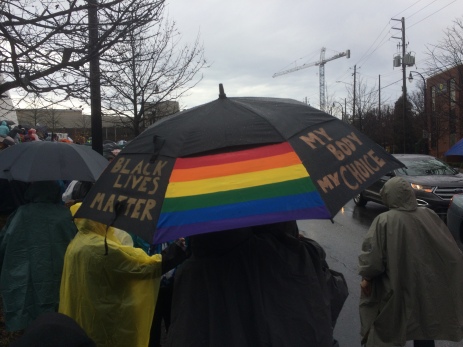
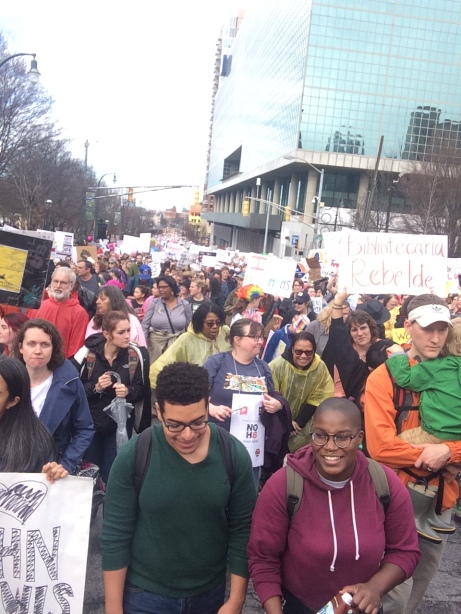
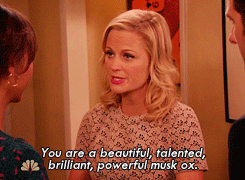
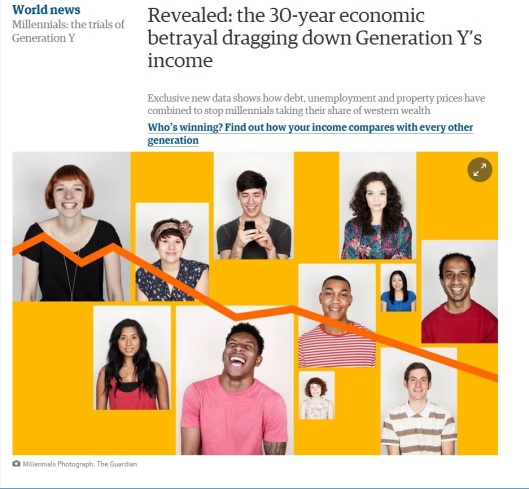
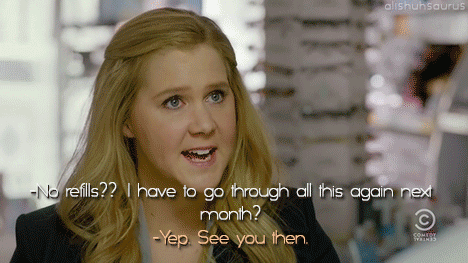 See the full 100% accurate video
See the full 100% accurate video 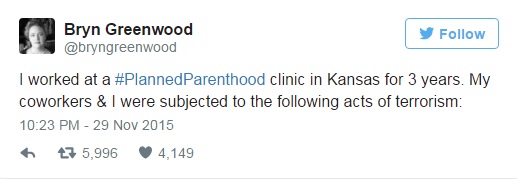



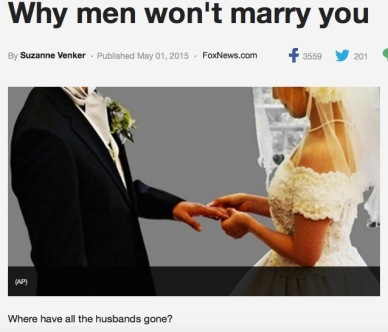
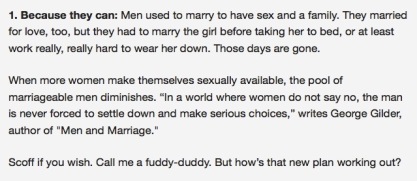
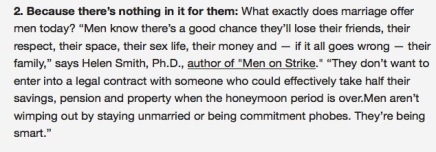



 How about instead of “what’s in it for him” we think about “what’s in it for them?” Last time I checked, marriage was a union between two people (and if conservatives are so worried about the rate of marriage, shouldn’t they welcome marriage equality with open arms?). Maybe this author should stop damning her own sex for destroying marriage and look at the bigger picture: the economy, job market, changes in society, etc. Perhaps the decline of marriage means women and men feel more independently secure. The millennial generation is proving that we don’t have to get married in order to feel happy and fulfilled. We can enjoy dating around until we find a partner who we truly connect with. And besides, aren’t first dates stressful enough without having to think, “Oh my god, is this person marriage material? If we get married, will they take all of my money? Will we have children and then have to go through a custody battle? If I don’t marry this person, will I be able to afford my rent?”
How about instead of “what’s in it for him” we think about “what’s in it for them?” Last time I checked, marriage was a union between two people (and if conservatives are so worried about the rate of marriage, shouldn’t they welcome marriage equality with open arms?). Maybe this author should stop damning her own sex for destroying marriage and look at the bigger picture: the economy, job market, changes in society, etc. Perhaps the decline of marriage means women and men feel more independently secure. The millennial generation is proving that we don’t have to get married in order to feel happy and fulfilled. We can enjoy dating around until we find a partner who we truly connect with. And besides, aren’t first dates stressful enough without having to think, “Oh my god, is this person marriage material? If we get married, will they take all of my money? Will we have children and then have to go through a custody battle? If I don’t marry this person, will I be able to afford my rent?”